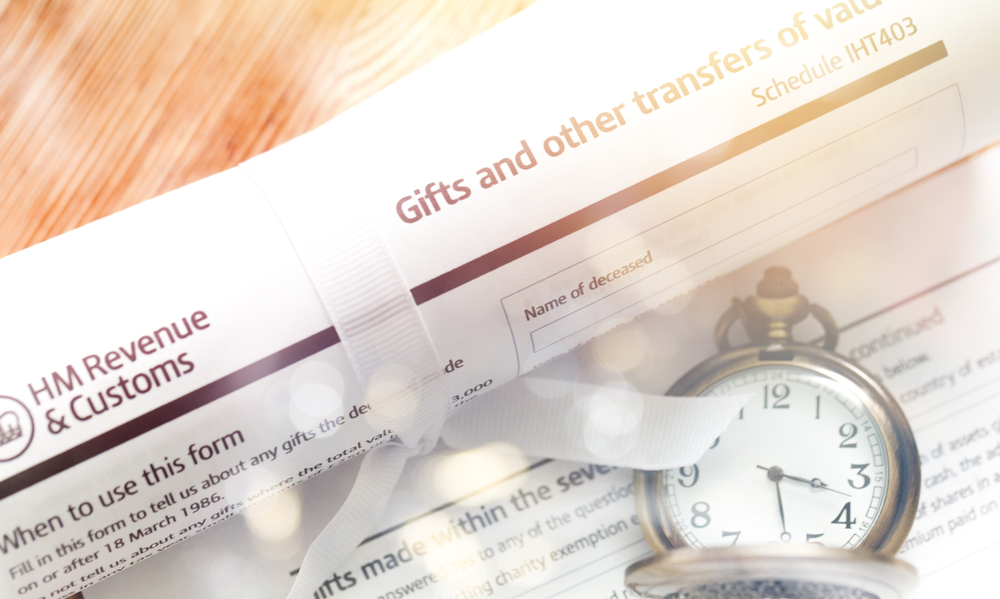HOW TO GIVE TO FAMILY WISELY
30
MARCH, 2023
Parents are increasingly looking for ways to help grown-up children in the here and now – rather than much later in life through inheritance.
Passing on wealth now means you can help loved ones financially when they really need it. Some people might choose to give money as a special Christmas present or a regular gift throughout the year to help out.
A recent study (1) showed that wealthy parents of grown-up children are handing over inheritance early to help ease the burden of the cost-of-living crisis. It highlights that the money is often intended to help their children with immediate living costs rather than more significant purchases like property.
Understanding how to pass on wealth in the most tax-efficient manner is crucial if you want to reduce the amount that HM Revenue & Customs (HMRC) can claim when it eventually comes to assessing inheritance tax.
The standard level of IHT for any assets worth over £325,000 (your nil rate band) is 40%. IHT only considers assets worth more than £325,000, including your property. If your estate is worth less than this, you can give away as much as you like, and your beneficiaries won’t be charged no matter how long you live.
For estates worth more than this, there are lots of exemptions which allow you to do this.
WHAT CAN I GIVE TO MY CHILDREN OR GRANCHILDREN?
One popular method is to take advantage of gifting allowances. Each tax year, you get an ‘annual exemption’.
An annual exemption allows you to give £3,000 as a gift, tax-free, without it adding to the value of your estate. Any unused annual exemption from the previous tax year can be carried over into the next one – but this can only be done for one tax year.
As a couple, that means being able to give away £6,000 or £12,000 if the exemption wasn’t used the year before. You can give as many gifts of up to £250 per person as you want each tax year, as long as you have not used another allowance on the same person.

INHERITANCE
You can also give your child a wedding or civil partnership gift of £5,000 (or £2,500 to a grandchild or great-grandchild). For anyone else, it’s £1,000. These gifts can be given on top of your annual exemption for £3,000 in the same tax year.
WHAT ABOUT GIFTING LARGER AMOUNTS?
You can use the Potentially Exempt Transfers (PET) rule to give larger sums to loved ones. You can give away all types of assets, including cash, property and shares, tax-free under this rule as long as you live for seven years after making the gift.
Some people might be tempted to think signing over their homes to loved ones while they’re still alive would be a clever move under the rules of Potentially Exempt Transfers. Provided you survive the gift by seven years, there is no inheritance tax to pay on the gift. But remember, it has to be an outright gift from which you can no longer benefit, which means that continuing to live there would essentially stop the seven-year clock from running.

REGULAR CASH GIFTS WITH NO TIME LIMIT
There is a way of giving away unlimited cash without falling foul of the seven-year rule – as long as it’s from surplus income and doesn’t reduce your standard of living or force you to dip into your capital to cover day-to-day costs.
An example of where it would be appropriate would be if, in previous years, you had saved £10,000 a year from your income. You could start gifting this £10,000 away to your children each year. It’s vital to keep a record of your income and expenditure for executors to prove the money given away was not needed to achieve exemption from inheritance tax.
SHOULD I SET UP A TRUST TO HELP MINIMISE IHT?
If you want to set aside money for your family further into the future, you could set up a trust to minimise inheritance tax.
A bare trust is commonly used, giving the named beneficiary or beneficiaries the immediate right to the trust fund and any income received from it. Bare trusts are a useful legal vehicle for passing assets on to minors, for example, with trustees managing the trust until the beneficiary or beneficiaries are aged 18.
Alternatively, discretionary trusts give greater power to trustees to decide how and when to give funds to beneficiaries. This can be useful for estate planning and save assets from being depleted unnecessarily.
This complex area typically needs to be set up correctly by a professional.
CAN I GIVE TAX EFFICIENTLY IN ANY OTHER WAYS?
For grandchildren, you could set up a Junior ISA or even a Junior SIPP (pension) and the money will grow free of taxes. The pension will also receive tax relief on contributions.
DECISION TIME – IT PAYS TO TALK
Working out how much you can afford to give away during your lifetime isn’t easy, with finances being stretched in all directions.
Getting professional help can assist with some difficult decisions to ensure you can help loved ones and won’t find yourself short further down the line – perhaps when faced with care costs.
It’s important to plan and include your family in any conversations – it can make such a difference and help remove some of the pressure many parents feel when thinking about how and when they’ll pass on their wealth.
A well-structured and tax-efficient estate plan is essential for the most efficient way to pass on wealth. It’s crucial not to leave yourself short just to save on tax bills, of course. An adviser can help formulate a plan that can benefit all of the family.
Some aspects of inheritance tax planning and Trusts are not regulated by the Financial Conduct Authority.
SOURCE
[1]https://home.barclays/news/press-releases/2022/09/cost-of-living-drives-early-inheritance-gifting
PROVIDING NEWS AND VIEWS TO SUIT ALL NEEDS
This Blog is published and provided for informational purposes only. The information in the Blog constitutes the author’s own opinions. None of the information contained in the Blog constitutes a recommendation that any particular investment strategy is suitable for any specific person.
Tavistock Partners Limited is authorised and regulated by the Financial Conduct Authority. Tavistock Partners (UK) Limited is authorised and regulated by the Financial Conduct Authority. Tavistock Private Client Limited is authorised and regulated by the Financial Conduct Authority. The Tavistock Partnership Limited is authorised and regulated by the Financial Conduct Authority. Abacus Associates Financial Services is a trading style of Tavistock Partners (UK) Limited which is authorised and regulated by the Financial Conduct Authority. Duchy Independent Financial Advisers is a trading style of Tavistock Partners Limited which is authorised and regulated by the Financial Conduct Authority, All subsidiaries are wholly owned by Tavistock Investments Plc.

